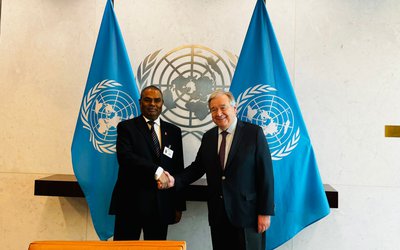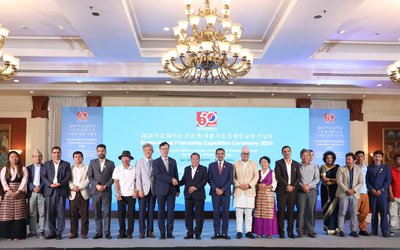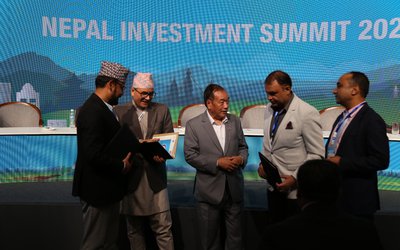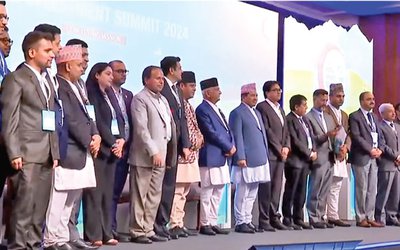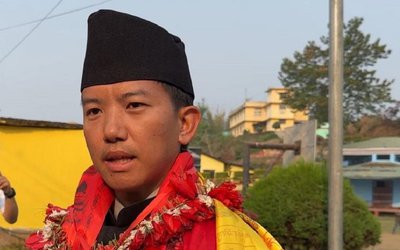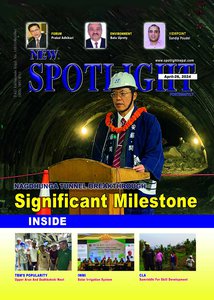The Lufti Kirdar Convention and Exhibition Center at Istanbul, Turkey,looked like a festival venue throughout the fourth United Nations Conference on the Least Developed Countries (UN LDC IV).
Some eight thousand delegates from most of the 192 member states of the UN were busy highlighting the plight of the poor. But, there seemed little consensus on how to move ahead.
Secretary General of the United Nations Ban Ki-moon insisted that instead of looking at the LDCs as poor and weak, they should be seen as the vast reservoir of untapped potential. “Investment in LDCs is not a charity. It is an opportunity for all,” said Ban Ki-moon
addressing the opening ceremony of the five-day conference (9-13 May,2011),
The Nepalese Prime Minister, Jhala Nath Khanal, who is also chairing the bureau of LDCs, called upon both LDCs and developed countries to seize the opportunity and work in a concerted way to help at least half of the LDCs graduate from the LDC status over the next decade.It is easier said than done.
“Business as usual is not going to resolve the problems being faced by the people of the LDCs,” warned Dr Arjun Karki, spokesperson and chair of the LDC IV Civil Society Forum. “There is a need for urgent and radical shift from the current development paradigm to genuine pro-people development.”
Civil Society leaders stressed that a world without LDCs needs more than a small increase in ODA, or settling for commitments which extend no further than the MDGs.
While LDCs represent about 12 per cent of the global population, their share of global merchandise trade and global GDP remains around 1 percent.
In 1971, the UN identified 24 of the world’s poorest countries as LDCs and called upon the world community to help raise socio-economic status of their people. Four decades down the lane, only three countries—Botswana, Cape Verde and Maldives—have been able to graduate from the LDC status. 48 countries of the world—with a combined population of over 850 million—now fall under this category.
Thirty-three LDCs are in the African continent while 14 are in Asia and the Pacific and only one — Haiti — in Latin America and the Caribbean.
unsustainable use of natural resources are the common features of these poorest countries of the world.
“To achieve a world without LDCs is not just a matter of upscaling resources, we need to be rethinking both the model and the practice of sustainable development”, said Demba Moussa Dembele, President of the LDC Watch, an NGO network formed after the last UN LDC Conference in 2001.
One much-talked about issue is the cancellation of the debt owed by the LDCs to several bilateral and multilateral donors. Another is the need to go beyond food security to food sovereignty. The current market approach to commodities encourages speculation and volatility in prices which makes it impossible for small farmers to have a sustainable livelihood, say civil society activists.
Nepali delegates taking part in the official negotiations lamented that rich and developed countries were not forthcoming to help the poor countries citing recent global financial crisis and high level of unemployment in their own countries, among other countries. They,instead, were focusing on effective utilisation of aid, good governance and democratisation among the LDCs. “As things stand now,there is little hope of a breakthrough in the Istanbul Program of Action that will guide the course of development for the LDCs over the next decade,” said a senior Nepali official taking part in the negotiations.
If that happens, that will be seen as betrayal to the plight of millions of poor by many.
- QATAR AMIR’S STATE VISIT: Five Agreements
- Apr 28, 2024
- TANAHU HYDROPOWER PROEJCT: A Significant Achievement
- Apr 15, 2024
- AMBASSADOR HANAN GODAR: Sharing Pain With A Nepali Family
- Mar 30, 2024
- VISIT OF KfW AND EIB TO NEPAL : Mission Matters
- Mar 25, 2024
- NEPAL BRITAIN SOCIETY: Pratima Pande's Leadership
- Mar 24, 2024








